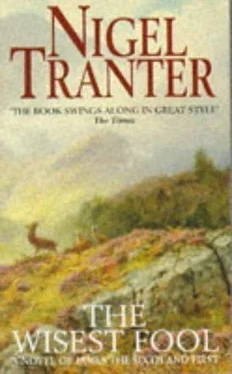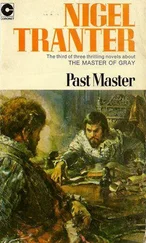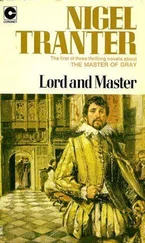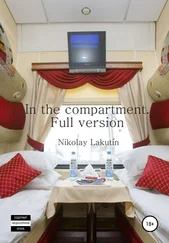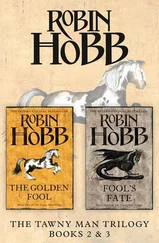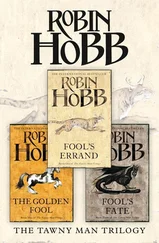Nigel Tranter - The Wisest Fool
Здесь есть возможность читать онлайн «Nigel Tranter - The Wisest Fool» весь текст электронной книги совершенно бесплатно (целиком полную версию без сокращений). В некоторых случаях можно слушать аудио, скачать через торрент в формате fb2 и присутствует краткое содержание. Жанр: Исторические приключения, на английском языке. Описание произведения, (предисловие) а так же отзывы посетителей доступны на портале библиотеки ЛибКат.
- Название:The Wisest Fool
- Автор:
- Жанр:
- Год:неизвестен
- ISBN:нет данных
- Рейтинг книги:4 / 5. Голосов: 1
-
Избранное:Добавить в избранное
- Отзывы:
-
Ваша оценка:
- 80
- 1
- 2
- 3
- 4
- 5
The Wisest Fool: краткое содержание, описание и аннотация
Предлагаем к чтению аннотацию, описание, краткое содержание или предисловие (зависит от того, что написал сам автор книги «The Wisest Fool»). Если вы не нашли необходимую информацию о книге — напишите в комментариях, мы постараемся отыскать её.
The Wisest Fool — читать онлайн бесплатно полную книгу (весь текст) целиком
Ниже представлен текст книги, разбитый по страницам. Система сохранения места последней прочитанной страницы, позволяет с удобством читать онлайн бесплатно книгу «The Wisest Fool», без необходимости каждый раз заново искать на чём Вы остановились. Поставьте закладку, и сможете в любой момент перейти на страницу, на которой закончили чтение.
Интервал:
Закладка:
"Aye. There's a peck o' them, here. Take it, Geordie. Aye, but first-the rings. You have some yet? "
Heriot delved into his pocket and produced a handful of gold-plated rings.
James made a quick calculation. "Three'll do. Three'll do fine, man."
There were the Mayor, and the chief alderman and the man who had brought the chalice-who was none other than George Robinson, one of the city sheriffs who had first come out with Sir William Ingleby. The others could be ignored.
So the transfer was made, the gold-filled chalice for three, plated rings stamped with the royal monogram. The King bestowed the latter upon recipients as though precious beyond rubies.
"We are pleased wi' you, much pleased," he beamed. "We will, ah, see you again. Later." "But-the sword, She. And the keys." "Ooh, aye. The sword and the keys. Och, well."
From one side a resplendent bearer was waved forward with the city keys gleaming like silver on a gold-tasselled cushion, and on the other, a stalwart individual with a helmet and the usual great two-handed sword. By touching the key and shooing the bearer away from him like an over-eager hen, James got rid of the first, but such tactics did not serve with the second, who seemed determined that the monarch should actually take the sword-unaware of his new liege lord's dire aversion to cold steel. James backed away-but he could not back very far or he would fall over the edge of the platform. Determinedly the other pursued him. Heriot would have taken the weapon for him but he had his arms full of gold angels.
"Awa' wi' you, you muckle limmer!" Majesty cried, in his broadest Doric. As a child he had been brought up in the large and noisy family of the Earl of Mar, hereditary keeper of Stirling Castle, where all spoke the Doric, and it remained his mother-tongue. The sword-bearer did not appear to understand.
"Your Majesty should take the sword, as symbol that you rule us all," Mayor Walter explained helpfully.
"I dinna want the sword, man!" the sorely-tried monarch snapped at him. "I can rule you a' fine, without yon!" George Heriot set down the chalice of gold pieces on the boards of the platform, "I will take the sword for His Grace," he said. "Give it to me."
That did not suit the sword-bearer, obviously a man who knew his own mind. The King was the proper and only recipient for York's sword, other than himself its custodian, and no jumped-up Scotchman was going to have it. Heriot came over to take it from him, muttering to the fellow not to be a fool, that the King could not abide naked steel.
James caught sight of his pot of gold sitting abandoned there in the middle of the platform, and letting out a wail, hurried over to stand guard over it. Anybody could have grabbed an angel or two. "Vicky! Vicky!" he quavered.
In fact, many of the foremost nobles had now recognised that something was amiss, and were hastening to the royal aid- although undoubtedly none of the Englishmen fully understood what was wrong. Lennox did, but he had not been nearest to the steps, and Lord Burleigh it was who arrived first on the platform, however stiffly.
"I will take the sword, as His Majesty's representative," he declared authoritatively.
George Heriot had no objection, but the sword-bearer remained more than doubtful, King James also had his reservations.
"Na, na-who asked you?" he demanded. "I cried on Vicky. Vicky Lennox."
"If Your Majesty does not wish to take the sword yourself, then I, as President of the North, am the proper recipient, as your Deputy, Sire."
"My lord-if His Majesty does not want the sword, it should be returned to me," the Mayor announced.
"Who says you're the President o' the North, man?" James asked. "Nae doubt you were. But I'd remind you-aye, and a' others-that no man now holds any office o' state lacking my royal appointment. Any, d'you hear? I can appoint whosoever I will to be President o' the North. Or none. Mind it." The King looked round, still trembling in his agitation, could not see Lennox, who was in a queue at the bottom of the steps, and found the Earl of Cumberland at his elbow. "Aye-you, man Cumberland. You take it. Yon sword. Take it out o' my sight. Geordie- you got the cuppie wi' the angels? Aye, well. Now-let's awa' out o' this. I've had enough o' this, God kens! And I'm hungry. My belly rumbles. Fetch my horse-you, Northumberland-fetch my horse. I'll climb on frae here. We'll see what they've got for victuals in this York…"
The Lord Mayor, aldermen and councillors of the city, left behind on their platforms, stared at each other and at the instrumentalists, there to lead the royal procession through the streets, and wrung their hands, rings or none.
That night, in the fine, lofty, beamed great hall of the Manor of St Mary, the former Benedictine Abbey now owned by Burleigh, the tables and remains of the banquet cleared away, George Heriot watched the scene from a quiet corner, a faint smile playing about his lips. Dancing was now in progress, the stately sort of dancing which Queen Elizabeth had delighted in, not the more robust Scots variety, and many handsome and finely dressed ladies now graced the royal presence. But James Stewart, up on the dais, was not much of a dancer-knock-knees and unsteady legs ensured that- nor was he very interested in women, young and good-looking men being more to his taste. As a consequence, he had settled down to an evening of hard drinking, abetted by a group of his Scots favourites and cronies, ignoring completely the efforts of sundry English notables to break into the circle, to present their ladies and friends. James, an arm round the neck of young Sir John Ramsay, his principal page, a youth of eighteen with the complexion of a girl and the ruthlessness of a wolf, sprawled at the dais table, high hat precariously askew-the only man in the great room covered-paying no attention to host, music, dancing, courtiers, suppliants or anything else than the replenishing of his own and his friends' wine cups. If he had felt any embarrassment when he discovered that his host for the week-end stay at York was not the Mayor and Council, nor the sheriffs, but none other than the Lord Burleigh in this Manor of St Mary, instead of the Guildhall, he had not let the matter trouble him. Burleigh was finding it just as impossible as were others to approach his royal guest.
Heriot, who knew his place with the monarch as exactly as he knew his debts and credits, was glad to stand aside and watch. By nature and inclination he was a mildly intrigued observer of the human scene rather than an active manipulator, happiest when circumstances allowed him to be an informed spectator. It was not that he was a negative man, any kind of drifter-anyone who suggested anything of the sort in the Scots capital would have been hooted at-but he was of a philosophical and reflective rather than a combative or assertive frame of mind. Observing King James was, in fact, always of absorbing interest to him, sometimes a joy, sometimes almost an agony, sometimes tragi-comedy or high farce, but never dull. The fact that he knew a real affection for and some understanding of his unusual sovereign lord added an element of personal involvement which gave point to all.
He caught the eye of Ludovick Stewart across the room. The Duke did not find it so easy to stand in a comer and watch, however much he would have preferred to, his lofty rank, proximity to the throne and friendly personality ensuring that. A certain innocence about him, in a Court where innocence was scarcely the dominant feature, seemed to attract women, especially the more mature woman, and he was much sought after-which did not please him, for he was deeply in love with Mary Gray, illegitimate daughter of the handsome and dashing Master of Gray, whom he of course, the only duke in two realms, could by no means have married even if he had not been wed already. A young man at odds with his fate was Lennox. Excusing himself to two effusive York ladies who had all but cornered him, he backed out and made his way across the floor to Heriot, circling the dancers.
Читать дальшеИнтервал:
Закладка:
Похожие книги на «The Wisest Fool»
Представляем Вашему вниманию похожие книги на «The Wisest Fool» списком для выбора. Мы отобрали схожую по названию и смыслу литературу в надежде предоставить читателям больше вариантов отыскать новые, интересные, ещё непрочитанные произведения.
Обсуждение, отзывы о книге «The Wisest Fool» и просто собственные мнения читателей. Оставьте ваши комментарии, напишите, что Вы думаете о произведении, его смысле или главных героях. Укажите что конкретно понравилось, а что нет, и почему Вы так считаете.
